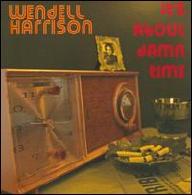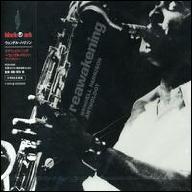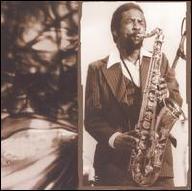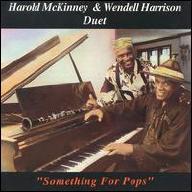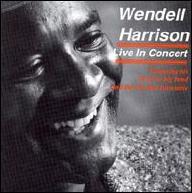Wendell Harrison was born in Detroit in 1942. He began studying clarinet at age seven. He attended Northwestern High School, and his classmates included trumpeter Lonnie Hillyer, drummer Roy Brooks, and saxophonist Charles McPherson. Harrison began formal jazz studies during the mid- to late '50s with pianist and composer Barry Harris at the Detroit Conservatory of Music (now called the Center for Creative Studies). During the latter part of the decade, he played early sessions for Motown and backed Marvin Gaye, as well as Aretha Franklin for Columbia.
In 1960, Harrison left Detroit to make his jazz mark in New York City. He won work early on with Grant Green, Eddie Jefferson, Jack McDuff, Elvin Jones, and Sun Ra -- the latter was also new to town. In 1964 he earned a spot in saxophonist Hank Crawford's road and studio crews. Between 1964 and 1968, Harrison recorded four albums with Crawford during his Atlantic period, including Mr. Blues, Dig These Blues, After Hours, and Double Cross. The experience proved doubly fruitful for Harrison: He learned to compose and arrange during his tenure with Crawford.
In 1970, he left New York for California briefly. He had picked up a drug habit and checked into Synanon for rehab. There he met and played with a host of other notable musicians including Art Pepper and Esther Phillips. In 1971, after completing treatment and recuperation, Harrison returned to Detroit.
Back in the Motor City, he started playing sessions anywhere and everywhere. He worked with jazz, rock, and R&B musicians in local studios and live, and played for radio and television commercials. He also became a jazz educator. Harrison taught music at Metro Arts, a creative complex for youth founded by Dr. Amelita Mandingo. While teaching at Metro Arts, he met legendary Detroit pianist and composer Harold McKinney and reconnected with trumpeter Marcus Belgrave, a friend whom he'd first met in New York. He also met trombonist and composer Phil Ranelin from Indianapolis, who had relocated to Detroit the year before.
Harrison and Ranelin conceived the Tribe organization as a holistic entity. They formed a record label (Tribe Records) and an artist's collective that held workshops, rehearsals, meetings, and gigs. Tribe conveyed a growing Black political consciousness in Detroit. The organization also included drummer/composer Doug Hammond, Belgrave, pianist Kenny Cox, and trumpeter Charles Moore among others. They performed together live and played on each other's Tribe Records albums. Tribe also published a magazine; a quarterly, then monthly publication dedicated to musical and political revolutionaries and political issues, it was published by Harrison's company, The Harrison Association.
The Tribe's first release was 1972's A Message from the Tribe, co-billed to Harrison and Ranelin. A combination of spiritual jazz, soul, and funk, the album sold marginally well during the 1970s, and has since become an oft-reissued classic among subsequent generations of listeners. The following year, Harrison released An Evening with the Devil, recorded in January 1972. Thanks to their forward-looking compositions and arrangements, the album and the rest of the label's catalog have been reissued several times, as have Ranelin's The Time Is Now, Harold McKinney's Voices Rhythms of the Creative Profile, Marcus Belgrave's Gemini II (all 1974) and Ranelin's Vibes from the Tribe (1976), which have been sampled often by hip-hop and electronic music producers.
The Tribe project ran its course and disbanded in 1976. Ranelin began working with Freddie Hubbard and moved to Los Angeles. In Detroit, Harrison played shows, formed his own bands, and continued in his role as an educator. He and McKinney co-founded Rebirth Inc. in 1978, an organization intended to foster young musicians. He'd also met jazz pianist, composer, and vocalist Pam Wise, who would soon become his wife and creative partner. Harrison founded the Wen-Ha label for his own projects and issued Dreams of a Love Supreme in 1980, performed by a big band. In 1981, Wen-Ha (featuring Harrison as producer, engineer, and saxophonist) released Reminiscing by bassist Reggie ShooBeDo Fields, who had played on several Tribe releases and performed with the Sun Ra Arkestra. The same year, Harrison issued Organic Dream, a decidedly more electric, contemporary jazz-funk outing that featured Wise on Rhodes piano and vocals along with Miche Braden.
By 1985, Rebirth Inc. had become a full-fledged arts organization. They produced jazz concerts, workshops, master classes, and interactive educational programs. Rebirth was also established by Harrison as a record label. His wonderfully funky, sleek, and soulful Birth of a Fossil marked its first release in 1985, and was followed a year later by Ranelin's Love Dream and his Reawakening, the latter a large group collaboration that also included Wise, McKinney, and noted vocalist Leon Thomas. The saxophonist issued Wait Broke the Wagon Down in 1987 and The Carnivorous Lady a year later.
The 1990s kicked off with Harrison's Forever Duke on the revived Wen-Ha in 1991. One of the saxophonist/clarinetist/producer's most highly regarded offerings, it included appearances by trumpeters Charles Tolliver and Rayse Biggs, and McKinney. He followed it a year later with Live in Concert: Featuring His 18 Piece Big Band and the Clarinet Ensemble (better known as Mama's Licking Stick Clarinet Ensemble). Among its participants were saxophonist/clarinetists James Carter and Vincent York, Belgrave, guitarist Ron English, and bassist Jaribu Shahid. The following year, Harrison and McKinney issued the acclaimed Something for Pops. Harrison's clarinet crusade continued on 1994's Rush Hustle, which also included appearances by Carter.
In 1996, in response to input from beatheads, producers, and record collectors, England's Soul Jazz/Universal Sound label released the double-length compilation Message from the Tribe: An Anthology of Tribe Records: 1972-1977. It collected music from all nine Tribe label albums, and a glossy, miniature facsimile edition of Tribe magazine in a deluxe slipcase. The response was massive. The compilation was written about in virtually every major -- and many minor -- music publications, it was featured on European, Asian, and internet radio, and it sold briskly. Japan's P-Vine label followed with Vibes from the Tribe, Vol. 1 and Vol. 2 in 1997. That same year, Harrison also appeared alongside McKinney, Belgrave, Donald Walden, Marion Hayden, and others on the all-star jazz showcase Michigan Masters: Urban Griots. In 1998, Harrison and saxophonist Eddie Harris released The Battle of the Tenors for Germany's Enja label to close out the 20th century.
In 2002, Harrison appeared (alongside Amp Fiddler) on rapper Proof's Electric Coolaid Acid Testing. That year, the saxophonist also released Eighth House: Riding with Pluto for local label Entropy Stereo Recordings. Unlike the rest of his discography, the set included only solo clarinet and saxophone pieces as well as a few duets in the company of master percussionist Jumma Santos. Harrison also released Urban Expressions in 2004, a collection of groove-laden originals and covers that included vocalist Jean Carn as a collaborator. The saxophonist joined Amp Fiddler's studio cast on Afro Strut and was featured on the duet and international hit single "If I Don't" with guest Corinne Bailey Rae.
Detroit electronic music producer, Planet E label boss, and DJ Carl Craig had been a longtime fan of the Tribe, and was only too aware of their international stature among record collectors and jazz and EDM fans. He enlisted Harrison to appear on his own Paris: Live album, then reengaged Belgrave as well. Craig formed a band of local and regional musicians who counted the Tribe a primary influence including Fiddler, Karriem Riggins, and the Motor City Horns. They recorded Tribe: Rebirth, issued in 2009 on Craig's fledgling Community Projects label, and took the group on tour. They performed as headliners at the annual Detroit Jazz Festival.
Harrison remained busy. In 2011 he released It's About Damn Time on Rebirth. Recorded with a quintet, the 21st century take on funky post-bop and groove-laden electric jazz included guest spots by drummer Gayelynn McKinney and Fiddler. The following year, Luv N' Haight-reissued Harrison's 1981 album Organic Dream.
In 2016, Harrison served as saxophonist and clarinetist in double bassist John Lindberg's BC3 to record the album Born in an Urban Ruin for CleanFeed. 2019 saw England's Strut/Art Yard labels team to release the Tribe compilation Hometown: Detroit Sessions 1990-2014. That same year, Harrison released a pair of digital-only comps: Post Bop Mix and Wendell's Orbit Mix.
In 2020, Harrison and Ranelin served as session players on Roy Ayers' inaugural volume on Ali Shaheed Muhammad and Adrian Younge's Jazz Is Dead label; and in 2021 Ranelin recorded Infinite Expressions under his own name. That same year, Harrison's lost 1975 album Farewell to the Welfare was rediscovered. Now-Again licensed it and sent the tapes to Bernie Grundman for mastering and lacquering. It was issued for the first time in a limited-edition deluxe package. In 2022, he released the current Get Up Off Your Knees, credited to The Wendell Harrison Tribe. Also that year, Ranelin and Harrison reunited with Muhammad, Younge, and drummer Greg Paul at Linear Labs Studios in L.A.'s Highland Park neighborhood. They cut seven original, co-written tunes, and issued them in January 2023 as Phil Ranelin and Wendell Harrison JID016. ~ Thom Jurek, Rovi


